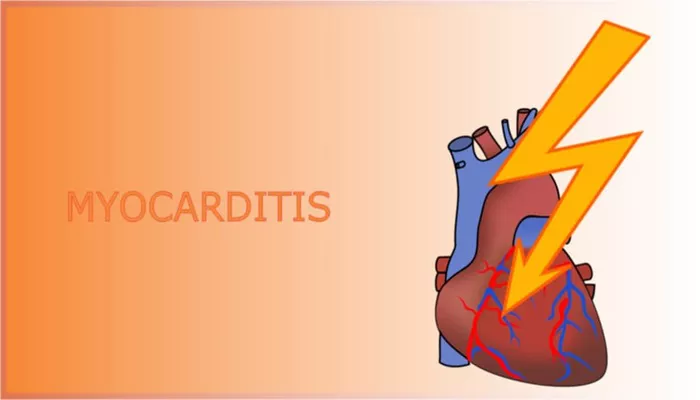Myocarditis is an inflammation of the heart muscle, known as the myocardium. This condition can significantly affect the heart’s ability to pump blood and can lead to serious complications, including heart failure and sudden cardiac death.
Athletes and active individuals should be particularly aware of myocarditis, as the condition can manifest during physical activity, such as running. This article will explore the symptoms of myocarditis when running, its causes, diagnosis, and management.
Causes of Myocarditis
The most common cause of myocarditis is viral infections. Viruses such as:
- Coxsackievirus
- Adenovirus
- Influenza virus
- COVID-19 virus
These pathogens can invade the heart muscle and trigger an inflammatory response. Other causes include:
Bacterial infections: Such as Lyme disease or staphylococcal infections.
Autoimmune diseases: Conditions like lupus or rheumatoid arthritis can lead to myocarditis.
Toxins: Exposure to certain drugs, alcohol, or chemicals can damage the heart muscle.
SEE ALSO: How to Relieve Myocarditis?
Symptoms of Myocarditis
Symptoms of myocarditis can be subtle and may develop gradually.
Common symptoms include:
Fatigue: A general sense of tiredness and lack of energy.
Shortness of breath: Difficulty breathing, especially during physical activity.
Chest pain: Discomfort or pain in the chest area.
Palpitations: A feeling of rapid or irregular heartbeats.
Dizziness or lightheadedness: Feeling faint, especially during exertion.
Swelling: Fluid retention in the legs, ankles, or feet.
Symptoms of Myocarditis When Running
When running or engaging in physical activity, individuals with myocarditis may experience specific symptoms that can indicate the presence of the condition. These symptoms may include:
1. Increased Fatigue
Athletes often push their limits, but those with myocarditis may notice an unusual level of fatigue during or after running.
This fatigue can be disproportionate to the effort exerted and may persist even after rest.
2. Shortness of Breath
During a run, individuals with myocarditis may experience shortness of breath that is not typical for their fitness level. This can occur even at lower intensities or during warm-up periods.
3. Chest Pain
Some runners may experience chest pain or discomfort while running.
This pain can be sharp or pressure-like and may worsen with exertion. It is essential to differentiate this from normal muscle soreness or exercise-related discomfort.
4. Palpitations
An individual with myocarditis may notice palpitations while running.
This sensation can feel like the heart is racing, fluttering, or skipping beats. Palpitations may be more pronounced during or immediately after exercise.
5. Dizziness or Lightheadedness
Dizziness or lightheadedness can occur during physical activity, especially if the heart is unable to pump blood effectively.
This can lead to fainting spells, which are particularly concerning during exercise.
6. Muscle Soreness
In some cases, individuals may experience muscle soreness that is out of proportion to their training. This can be a sign of systemic inflammation affecting the body’s response to exercise.
7. Increased Heart Rate
An elevated heart rate at rest or during exercise can indicate underlying issues. A resting heart rate that is significantly higher than usual may suggest myocarditis.
Importance of Recognizing Symptoms
Recognizing the symptoms of myocarditis, especially when running, is crucial for early diagnosis and treatment. Athletes and active individuals should be aware of their bodies and report any unusual symptoms to a healthcare provider. Early intervention can prevent complications and improve outcomes.
Diagnosis of Myocarditis
Diagnosing myocarditis involves a comprehensive evaluation, including:
1. Medical History and Physical Examination
A healthcare provider will review the patient’s medical history, including any recent infections, symptoms, and exercise habits. A physical examination will assess heart sounds, rhythm, and signs of fluid retention.
2. Electrocardiogram (ECG)
An ECG records the heart’s electrical activity and can identify arrhythmias or other abnormalities associated with myocarditis.
3. Echocardiogram
An echocardiogram uses sound waves to create images of the heart’s structure and function. It can reveal areas of inflammation or reduced heart function.
4. Cardiac Magnetic Resonance Imaging (MRI)
Cardiac MRI is a non-invasive imaging technique that provides detailed information about the heart muscle. It can help identify inflammation and assess the extent of damage.
5. Blood Tests
Blood tests can check for markers of inflammation, heart damage, and viral infections. Elevated levels of troponin, a protein released when the heart is damaged, may indicate myocarditis.
Management of Myocarditis
The management of myocarditis depends on the severity of the condition and the underlying cause. Treatment options may include:
1. Medications
Anti-inflammatory drugs: Nonsteroidal anti-inflammatory drugs (NSAIDs) may help reduce inflammation and relieve symptoms.
Corticosteroids: In severe cases, corticosteroids may be prescribed to reduce inflammation.
Heart failure medications: If myocarditis leads to heart failure, medications such as diuretics, ACE inhibitors, or beta-blockers may be used to manage symptoms.
2. Activity Modification
Athletes diagnosed with myocarditis are often advised to refrain from physical activity for several months. This allows the heart to heal and reduces the risk of complications, such as arrhythmias or sudden cardiac death.
Conclusion
Myocarditis is a serious condition that can significantly impact heart function and overall health. For athletes and active individuals, recognizing the symptoms of myocarditis, especially during running, is crucial for early diagnosis and treatment. Symptoms such as increased fatigue, shortness of breath, chest pain, palpitations, and dizziness should not be ignored.

